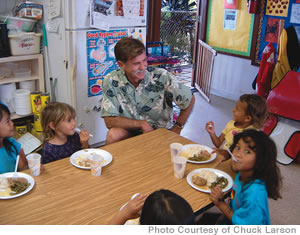Quality In Early Education

Fine Dining at Seagull School: Director Chuck Larson
enjoys lunch with a few hungry students
As the director of Seagull Schools, I have watched the organization grow from a small school in Kailua with 38 children to a business with 830 children and 50 seniors at six childcare centers that are located in Kailua, downtown Honolulu (The Early Education Center), Ewa Beach, Kapolei and Kohala on the Big Island.
Like many business leaders in Hawaii, one of my greatest challenges continues to be the recruitment of qualified staff. In the field of early education, the challenge is compounded by appropriate state regulations regarding teachers and their educational qualifications.
In these days of keen competition for teachers, we have realized that creative solutions need to be developed especially if we are continuing to grow. Free college credit courses that lead to teacher certification is one of Seagull Schools’ recent strategies. Last year the McInerny Foundation provided Seagull Schools with a $100,000 “Funding that Makes a Difference” grant. With that grant, Seagull began offering free PACE teacher training classes through Honolulu Community College. PACE stands for Professional and Career Education for Early Education, and is flexibly taught through a series of 16 workshops that can be converted to college credits that meet formal training requirements for the Child Development Associate (C.D.A.) credential.
As we were thinking about who was not already in the work force, we concluded that Seagull Schools should perhaps concentrate on trying to recruit high school students and retired persons. Seagull’s experience with older volunteers through our intergenerational programs and McKinley High School students, who had affiliated with our school through their regular course work, had been very positive, and in many instances those people eventually became regular employees.
As a result of the McInerny grant, in January of this year, two of our Seagull Schools directors began teaching the PACE courses at the McKinley School for Adults and at Kapolei High School. So that the classes would be particularly convenient for high school students and retired persons, the courses started at 7 a.m. on Tuesdays and Thursdays at Kapolei and at 2:30 p.m. on Tuesdays at McKinley.
As a result of attending the recently concluded PACE class, McKinley High School student Justine Robinson recently was hired part time as a teacher’s aide at Seagull’s Early Education Center. Lisa Uyehara, the PACE course instructor and administrative director at the Early Education Center, said, “Considering that Justine was in a college class that was mostly adults, it was satisfying to see her interest and participation grow as the class progressed. We are really pleased that she is now working at our school.”
Another student, who already works as a teacher’s aide, Kim Hailer, took the PACE class so that she could upgrade her professional qualifications to eventually become a teacher. Kim said, “the class was really enjoyable and I was able to apply much of what I learned directly to the classroom where I worked.”
To continue attracting new people to the field of early education, and to help current preschool teachers upgrade their qualifications, the Seagull Schools-sponsored PACE courses will continue until funds from the McInerny Foundation grant are completely expended. Although tuition and books for the classes are free, there is a $50 deposit that is refunded upon completion of the course and return of the books.
A new PACE course ED105 that began on May 8 was filled and over-enrolled before it was even announced. Other courses will begin again in August at the Early Education Center near the State Capitol and at Kapolei High School at times yet to be determined. Interested persons can call Lisa Uyehara at 533-0004 or Ann Abeshima at 689-6021.
These classes are open to anyone, not just Seagull Schools’ employees. I am hoping that this project that is currently funded by a private foundation grant will serve as a model that will eventually receive more public funding.
There is general agreement regarding the importance of quality in teaching young children, and I believe that expanded and improved early education is Hawaii’s best strategy for improving the outcomes of our public school system.
E-mail this story | Print this page | Comments (0) | Archive | RSS Comments (0) |
Most Recent Comment(s):




 Del.icio.us
Del.icio.us








